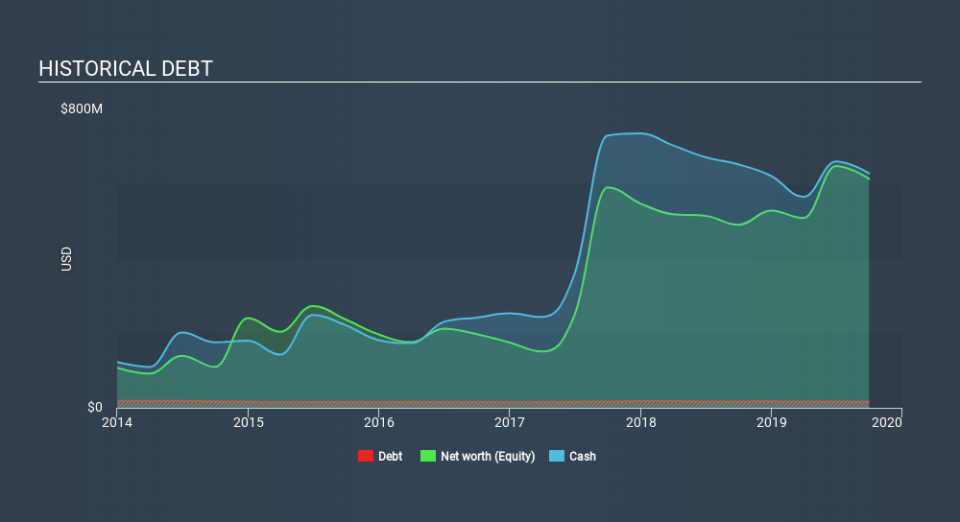FibroGen (NASDAQ:FGEN) Has A Pretty Healthy Balance Sheet

David Iben put it well when he said, 'Volatility is not a risk we care about. What we care about is avoiding the permanent loss of capital. It's only natural to consider a company's balance sheet when you examine how risky it is, since debt is often involved when a business collapses. We can see that FibroGen, Inc. (NASDAQ:FGEN) does use debt in its business. But should shareholders be worried about its use of debt?
Why Does Debt Bring Risk?
Debt assists a business until the business has trouble paying it off, either with new capital or with free cash flow. In the worst case scenario, a company can go bankrupt if it cannot pay its creditors. However, a more frequent (but still costly) occurrence is where a company must issue shares at bargain-basement prices, permanently diluting shareholders, just to shore up its balance sheet. Of course, the upside of debt is that it often represents cheap capital, especially when it replaces dilution in a company with the ability to reinvest at high rates of return. The first step when considering a company's debt levels is to consider its cash and debt together.
See our latest analysis for FibroGen
What Is FibroGen's Net Debt?
You can click the graphic below for the historical numbers, but it shows that FibroGen had US$16.3m of debt in September 2019, down from US$16.9m, one year before. However, its balance sheet shows it holds US$628.6m in cash, so it actually has US$612.4m net cash.
How Strong Is FibroGen's Balance Sheet?
Zooming in on the latest balance sheet data, we can see that FibroGen had liabilities of US$87.3m due within 12 months and liabilities of US$193.0m due beyond that. Offsetting these obligations, it had cash of US$628.6m as well as receivables valued at US$145.2m due within 12 months. So it actually has US$493.6m more liquid assets than total liabilities.
This surplus suggests that FibroGen has a conservative balance sheet, and could probably eliminate its debt without much difficulty. Succinctly put, FibroGen boasts net cash, so it's fair to say it does not have a heavy debt load!
It was also good to see that despite losing money on the EBIT line last year, FibroGen turned things around in the last 12 months, delivering and EBIT of US$31m. The balance sheet is clearly the area to focus on when you are analysing debt. But it is future earnings, more than anything, that will determine FibroGen's ability to maintain a healthy balance sheet going forward. So if you want to see what the professionals think, you might find this free report on analyst profit forecasts to be interesting.
Finally, a company can only pay off debt with cold hard cash, not accounting profits. While FibroGen has net cash on its balance sheet, it's still worth taking a look at its ability to convert earnings before interest and tax (EBIT) to free cash flow, to help us understand how quickly it is building (or eroding) that cash balance. During the last year, FibroGen burned a lot of cash. While investors are no doubt expecting a reversal of that situation in due course, it clearly does mean its use of debt is more risky.
Summing up
While it is always sensible to investigate a company's debt, in this case FibroGen has US$612.4m in net cash and a decent-looking balance sheet. So we don't have any problem with FibroGen's use of debt. The balance sheet is clearly the area to focus on when you are analysing debt. However, not all investment risk resides within the balance sheet - far from it. Consider for instance, the ever-present spectre of investment risk. We've identified 1 warning sign with FibroGen , and understanding them should be part of your investment process.
When all is said and done, sometimes its easier to focus on companies that don't even need debt. Readers can access a list of growth stocks with zero net debt 100% free, right now.
If you spot an error that warrants correction, please contact the editor at editorial-team@simplywallst.com. This article by Simply Wall St is general in nature. It does not constitute a recommendation to buy or sell any stock, and does not take account of your objectives, or your financial situation. Simply Wall St has no position in the stocks mentioned.
We aim to bring you long-term focused research analysis driven by fundamental data. Note that our analysis may not factor in the latest price-sensitive company announcements or qualitative material. Thank you for reading.

